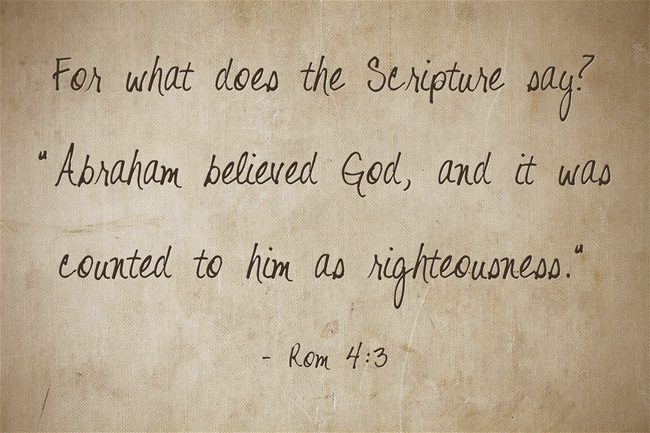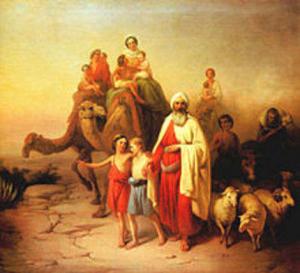Here is a Sunday school lesson on Abraham.
God Calls Abram
Genesis 12:1 “Now the Lord said to Abram, “Go from your country and your kindred and your father’s house to the land that I will show you.”
You have to wonder how God spoke to Abram (later changed to Abraham). Was it an audible voice as we can presume? Either way, Abram didn’t think about it or hesitate, it was simply stated, “So Abram went, as the Lord had told him, and Lot went with him. Abram was seventy-five years old when he departed from Haran” (Gen 12:4). Imagine leaving your family, your home, your job, your nation, and your former pagan religion and going to a place that Abram had never seen before. God’s promise to Abram was “I will make of you a great nation, and I will bless you and make your name great, so that you will be a blessing. I will bless those who bless you, and him who dishonors you I will curse, and in you all the families of the earth shall be blessed” (Gen 12:2-3). So “Abram went” (Gen 12:4).
Can you even imagine leaving everything you know for everything unknown?
How do you think God communicated to Abram?
What would you have done?
Abram’s Generosity
Genesis 13:8-9 “Then Abram said to Lot, “Let there be no strife between you and me, and between your herdsmen and my herdsmen, for we are kinsmen. Is not the whole land before you? Separate yourself from me. If you take the left hand, then I will go to the right, or if you take the right hand, then I will go to the left.”
Abram, as the patriarchal head of the clan or family, could have demanded the best land for himself, instead he gives Lot the first choice and Lot selects the best land but he ends up pitching his tent toward Sodom but God again reassures Abram by telling him to “Lift up your eyes and look from the place where you are, northward and southward and eastward and westward, for all the land that you see I will give to you and to your offspring forever. I will make your offspring as the dust of the earth, so that if one can count the dust of the earth, your offspring also can be counted. Arise, walk through the length and the breadth of the land, for I will give it to you” (Gen 13:14-17). Abram came out better off in the long run by being generous while, in the end, Lot ends up living in a cave with his two daughters because Lot was afraid (Gen 19:30). This is the last we ever hear about Lot.
Why did Abram offer Lot the best land when he had every right to it?
What does this tell you about Abram?
Who, besides Abram, is considered the “father of the faithful?”
Abram Believes God
Genesis 15:6 “And he believed the LORD, and he counted it to him as righteousness.”
To believe in God is to believe in what God says and when Abram acted on his belief of God, God accredited it or counted it as righteousness toward Abram. God told Abram “Look toward heaven, and number the stars, if you are able to number them.” Then he said to him, “So shall your offspring be.” And he believed the Lord, and he counted it to him as righteousness” (Gen 15:5-6). Again, in this chapter, as we saw in Genesis 12, Abram shows no hesitancy but simple believes God and God sees belief in Him as righteousness.
Is Abram’s belief in God like being justified by faith?
Could the stars really be numbered?
What impresses you most about Abram?
Justified by Faith
Romans 4:3 “For what does the Scripture say? “Abraham believed God, and it was counted to him as righteousness.”
The cross of Christ looks forward into the future for those who will repent and trust in Christ but also extends backward into time to cover those who believed God and God accredited it to them as righteousness. The Apostle Paul wrote, “For we say that faith was counted to Abraham as righteousness” (Rom 4:9b) as God’s “purpose was to make him the father of all who believe without being circumcised, so that righteousness would be counted to them as well, and to make him the father of the circumcised who are not merely circumcised but who also walk in the footsteps of the faith that our father Abraham had before he was circumcised’ (Rom 4:11-12).
Why does Paul mention that Abraham believed God “without being circumcised?”
Does Jesus’ shed blood cover all sins of the saints of the Old Testament?
What “Scripture” is Paul referring to when he wrote “For what does the Scripture say?”
Dead yet Alive
Romans 4:17-18 “as it is written, “I have made you the father of many nations”—in the presence of the God in whom he believed, who gives life to the dead and calls into existence the things that do not exist. In hope he believed against hope, that he should become the father of many nations, as he had been told, “So shall your offspring be.”
For Abraham, he “did not weaken in faith when he considered his own body, which was as good as dead (since he was about a hundred years old), or when he considered the barrenness of Sarah’s womb. No unbelief made him waver concerning the promise of God, but he grew strong in his faith as he gave glory to God, fully convinced that God was able to do what he had promised. That is why his faith was “counted to him as righteousness” (Rom 4:19-22). The Scriptures which say that it as by “words [that] it was counted to him” were not written for his sake alone, but for ours also. It will be counted to us who believe in him who raised from the dead Jesus our Lord” (Rom 4:23-24).
Do you think you were one of those “for his sake” that these Scriptures were written too?
Do you believe that your faith in Christ is counted as righteousness toward you?
Is Abraham’s faith still a testimony of the faithful today?
Conclusion
I urge you in your study to look at all of the Bible verses and read them aloud in the class so that you can get the most out of this lesson on Abraham, the father of the faithful. He believed God and God saw that as righteousness. Abraham was an example for us today in that no matter what things look like, God can do what He promises to do, even if it’s through a womb that’s beyond childbearing age (like Sarah’s).
Does it seem a far stretch for Abraham’s faith to be enough to save Him?
Did Abraham always live out a life of faith before God (Gen 20:8-13)?
How has your understanding about Abraham changed after this study?
Article by Jack Wellman
Jack Wellman is Pastor of the Mulvane Brethren Church in Mulvane Kansas. Jack is also the Senior Writer at What Christians Want To Know whose mission is to equip, encourage, and energize Christians and to address questions about the believer’s daily walk with God and the Bible. You can follow Jack on Google Plus or check out his book Teaching Children the Gospel available on Amazon.












